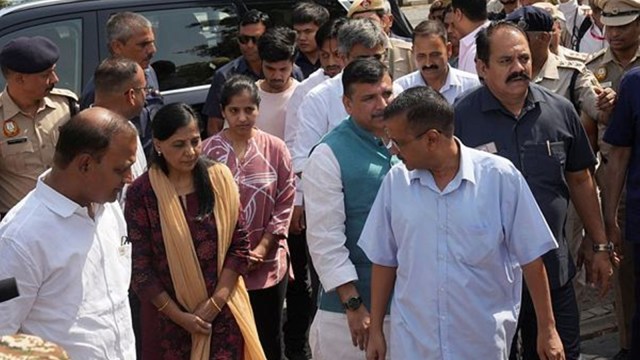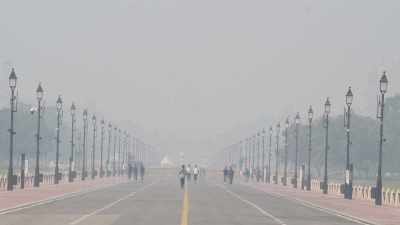As Delhi HC stays Arvind Kejriwal bail in ED case, CBI knocks on his door
Kejriwal had moved the Supreme Court against the High Court decision to reserve its verdict on the stay application.
 Delhi Chief Minister Arvind Kejriwal made a visit to Raj Ghat along with his family and party leaders, as he left for Tihar on June 02, 2024. (Express photo by Abhinav Saha)
Delhi Chief Minister Arvind Kejriwal made a visit to Raj Ghat along with his family and party leaders, as he left for Tihar on June 02, 2024. (Express photo by Abhinav Saha)Hours after the Delhi High Court allowed the application of the Enforcement Directorate and stayed the June 20 trial court order granting bail to Delhi Chief Minister Arvind Kejriwal in an alleged money laundering case, the CBI prepared the grounds to arrest him in the Delhi excise policy case it is investigating separately.
Sources said the CBI questioned Kejriwal in Tihar Jail Tuesday — arrested by the ED on March 21, he is currently lodged there — and will approach a Delhi court Wednesday to seek his custody.
AAP Rajya Sabha MP Sanjay Singh, in a video post, alleged: “Just when there was a chance that CM Arvind Kejriwal was likely to get bail from the Supreme Court, the BJP-led Centre has hatched a conspiracy with the CBI… to file a false case and get him placed under arrest… The entire country is witnessing this crime, this atrocity by the Centre.”
On Tuesday, Justice Sudhir Kumar Jain of Delhi High Court stayed the trial court order granting bail to Kejriwal, saying the vacation judge did so “without going through and appreciating the entire material brought on record by the rival parties which reflects perversity” in the June 20 order.
Justice Jain, who had reserved his verdict on June 21 on the ED application for a stay, made it clear that nothing in his order should be taken as an opinion or observation on the merits of the ED’s main petition challenging the trial court order. That matter is listed for July 10.
Kejriwal had moved the Supreme Court against the High Court decision to reserve its verdict on the stay application.
On Monday, the Supreme Court vacation bench of Justices Manoj Misra and S V N Bhatti had said it would wait for the High Court verdict and hear his plea on June 26.
In a 34-page order Tuesday, Justice Jain said, “The Vacation Judge while passing the Impugned Order (bail order) did not appropriately appreciate the material/documents submitted on record and pleas taken by ED and the averments/grounds as raised in the petition under section 439 (2) of the Code (of Criminal Procedure) require serious consideration while dealing with the said petition. Accordingly, the present application is allowed and the operation of the Impugned Order is stayed.”
Taking note of paras 16 and 36 of the trial court order, passed by vacation judge Niyay Bindu of the Rouse Avenue Court, the bench said, “It is not understandable that on one hand, the Vacation Judge has expressed her inability to go through entire documents stated to have been running into thousands of pages at the time of passing the Impugned Order, and on the other hand, how in para no. 36 the Vacation Judge has mentioned that relevant arguments and contentions raised on behalf of the parties are dealt with.”
“The perusal of the Impugned Order is reflecting that the Vacation Judge has passed the Impugned Order without going through and appreciating the entire material brought on record by the rival parties which reflects perversity in Impugned Order. There is factual force in the arguments advanced by Sh. S V Raju (appearing for the ED) that the Vacation Judge has not passed the Impugned Order after due consideration of (the) entire material on record,” it said.
The bench said the observations made by the vacation judge in the bail order were “uncalled for, unwarranted and out of context” and the trial court should “refrain from making such observations in the Impugned Order”. It said the vacation judge was required to consider “every important and relevant document” at the time of passing the bail order.
It said paras 1 to 6 of the bail order mentioned the contentions of both the parties and the arguments advanced by their respective counsel but a perusal of the order reflects that “the Vacation Judge did not discuss and consider the contentions and the arguments in Impugned Order”.
It took note of the submission by Senior Advocate A M Singhvi, appearing for Kejriwal, that grant of bail and cancellation of bail are two different aspects – he had also cited various judgments.
The bench said, “It is (an) accepted proposition of law that the rejection of the bail in a non-bailable case at initial stage and the cancellation of bail so granted have to be considered and dealt with on different basis and very cogent and overwhelming circumstances are necessary for an order directing the cancellation of bail already granted… whether the present main petition under section 439 (2) of the Code is maintainable or not maintainable has to be considered appropriately by the Roster Bench concerned while dealing with the main petition.”
Regarding Additional Solicitor General S V Raju’s submission that the vacation judge had not given appropriate opportunity to the ED to oppose the CM’s bail plea as per the mandate of PMLA section 45, the bench said, “Every court is under an obligation to give sufficient and appropriate opportunity to represent their respective case before the court. ED ought to have been given adequate opportunity to advance arguments on bail application by the Vacation Judge.”
The bench referred to the Supreme Court’s 2022 decision in Vijay Madan Lal Choudhary v Union of India which observed that at the stage of consideration of application for grant of bail, it is expected to consider the question from the angle whether the accused was possessed of the requisite mens rea (the intention or knowledge of wrongdoing) and the court is not required to record a positive finding that the accused had not committed an offence under the Act.
“It was further observed that the Court ought to maintain a delicate balance between a judgment of acquittal and conviction and order granting bail much before commencement of trial… However, the Vacation Judge, in the Impugned Order, has not discussed the requirement of section 45 of PMLA while passing the Impugned Order. The trial court should have at least recorded its satisfaction about fulfilment of twin conditions of section 45 of PMLA before passing the impugned order,” it said.
On the observation in the bail order that there was “mala fide” on the ED’s part, Justice Jain referred to the April 9 order of a coordinate single-judge bench of the High Court which, while upholding the CM’s arrest by ED, had observed the “absence of any mala fide intention” on the part of the agency.
He said the bench cannot lose sight of the fact that the Supreme Court, while hearing the SLP against the April 9 order, had granted leave but did not stay the operation of the High Court decision.
On the ED’s charge of the vicarious liability of Kejriwal as per PMLA section 70, the bench said, “The perusal of written note submitted by ED before the Special Judge/Vacation Judge reflects that the issue regarding the role of respondent for vicarious liability was taken by ED… but said issue did not find any place in the Impugned Order.”







